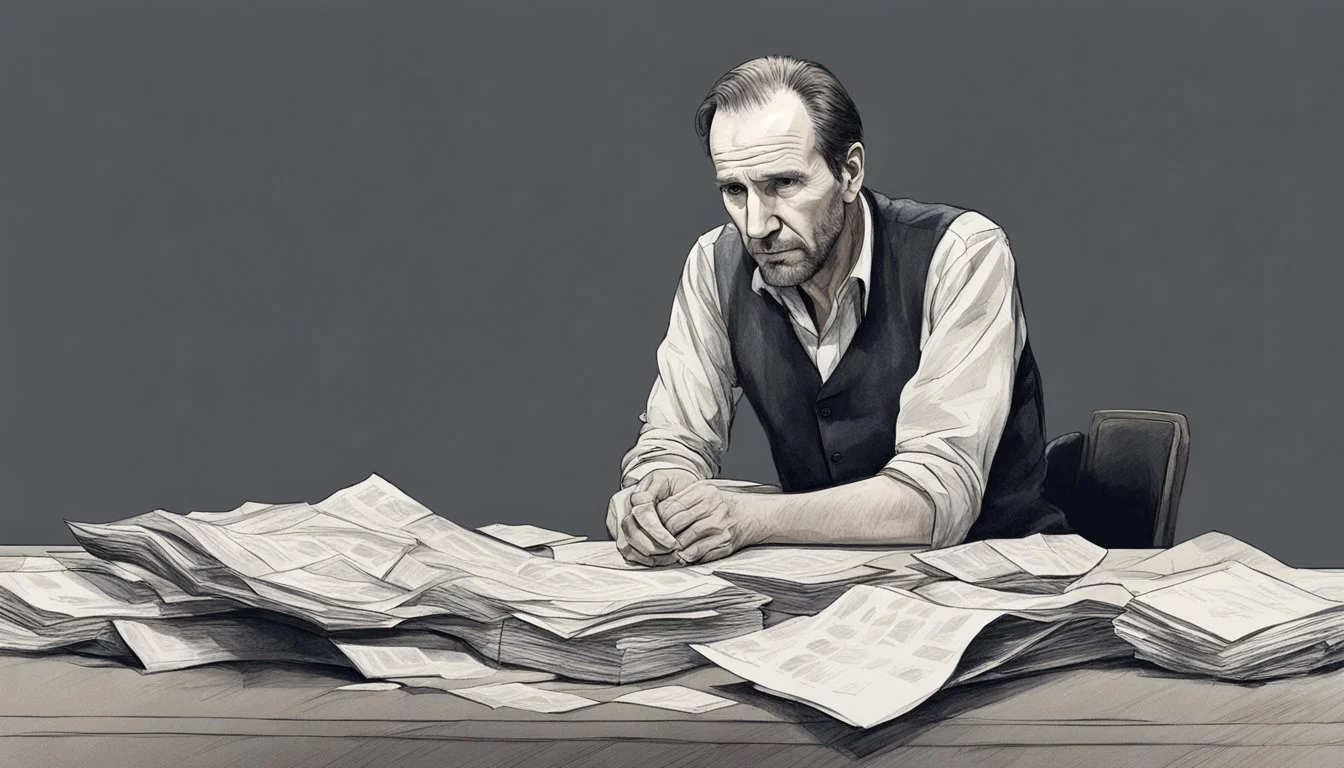Shakespearean Sorrows: Ralph Fiennes' Battle with Depression
Actor's Struggle Unveiled
Ralph Fiennes, renowned for his captivating performances, has long been drawn to the emotional depths of Shakespearean characters. His directorial debut with "Coriolanus" in 2011 showcased not only his acting prowess but also his profound understanding of Shakespeare's complex narratives. Fiennes' connection to these roles may stem from his personal struggles with depression, mirroring the profound sorrows often depicted in Shakespeare's works.
The actor's journey through both classical theater and contemporary cinema has been marked by his ability to portray characters grappling with intense emotional turmoil. This talent is particularly evident in his interpretation of Shakespearean roles, where he brings to life the nuanced psychological states that have captivated audiences for centuries. Fiennes' own experiences with mental health challenges likely inform his approach to these characters, lending an authenticity to his performances that resonates deeply with viewers.
In exploring Fiennes' battle with depression through the lens of Shakespearean sorrows, we gain insight into the universal nature of human suffering. The timeless themes of grief, loss, and inner conflict found in Shakespeare's plays continue to speak to modern audiences, especially when brought to life by actors who can channel their personal struggles into their craft. Fiennes' work serves as a bridge between the emotional landscape of classical literature and contemporary experiences of mental health.
The Plight of Ralph Fiennes
Ralph Fiennes, a renowned actor known for his Shakespearean roles, has faced personal struggles throughout his career. His journey from early life to stardom has been marked by challenges, both on and off stage.
Early Life and Career
Ralph Fiennes was born in Suffolk, England, in 1962. He grew up in a creative family, with his parents involved in farming and photography. Fiennes showed an early interest in acting, attending the Royal Academy of Dramatic Art.
His career began in theater, where he quickly gained recognition for his talent. In 1988, he joined the Royal Shakespeare Company, marking the start of his long association with Shakespearean works.
Fiennes' breakthrough came with his role in "Schindler's List" (1993), earning him an Academy Award nomination. This success launched his film career, balancing stage and screen performances.
Journey Through Shakespearean Roles
Fiennes has tackled numerous Shakespearean roles, showcasing his versatility and depth as an actor. He has portrayed Hamlet, Mark Antony, and Coriolanus, among others.
In 2011, Fiennes directed and starred in a film adaptation of "Coriolanus." This modern take on Shakespeare's tragedy received critical acclaim, demonstrating Fiennes' ability to bring classical works to contemporary audiences.
His performances in these complex roles have often been intense and emotionally demanding. Fiennes immerses himself deeply in his characters, a process that can be mentally taxing.
Public Perception and Media Coverage
Despite his success, Fiennes has struggled with public scrutiny and media attention. He is known for being intensely private, often avoiding interviews and public appearances.
The media has sometimes portrayed Fiennes as brooding or difficult, focusing on his serious roles and reserved demeanor. This perception has led to speculation about his personal life and mental state.
Fiennes has occasionally addressed these issues, emphasizing the importance of maintaining a balance between his public and private lives. He remains committed to his craft, continuing to challenge himself with diverse and demanding roles.
Shakespearean Influence on Fiennes' Craft
Ralph Fiennes' immersion in Shakespeare's works profoundly shaped his acting technique and artistic vision. His deep understanding of the Bard's characters infused his performances with nuanced depth and emotional resonance.
Merging Life with the Bard's Tragedies
Fiennes drew parallels between Shakespeare's tragic heroes and his own emotional struggles. He connected with the inner turmoil of characters like Hamlet and King Lear, using his personal experiences to bring authenticity to his portrayals.
His interpretation of Coriolanus showcased this synthesis of life and art. Fiennes directed and starred in a film adaptation, setting the Roman tragedy in a modern context while preserving Shakespeare's language.
The actor's approach to Shakespearean roles involved intense preparation. He studied historical contexts, analyzed character motivations, and explored the musicality of the verse to fully embody each role.
The Art of Interpretation
Fiennes' talent for interpreting Shakespeare's text set him apart. He breathed new life into familiar characters, finding fresh nuances in their words and actions.
His performances in Henry VI and Julius Caesar demonstrated his ability to convey complex emotions through subtle vocal inflections and physical gestures. Fiennes' command of Shakespearean language allowed him to make centuries-old dialogue feel immediate and relevant.
In The Tempest, he portrayed Prospero with a mix of power and vulnerability, showcasing his range as an actor. His reading of Shakespeare's sonnets further highlighted his skill in conveying the poetry's emotional depth.
Fiennes' dedication to Shakespearean acting techniques influenced his approach to all roles, classical and contemporary alike.
Ralph Fiennes as a Director
Ralph Fiennes transitioned from acclaimed actor to director with his adaptation of Shakespeare's "Coriolanus". His directorial approach showcased a deep understanding of Shakespearean text while presenting it in a contemporary context.
Debut with 'Coriolanus'
Fiennes made his directorial debut in 2011 with "Coriolanus", a modern adaptation of Shakespeare's tragedy. He also starred in the title role, bringing his extensive Shakespearean acting experience to the project. The film received positive reviews for its bold reimagining of the play in a contemporary setting.
Fiennes' adaptation moved the story to a war-torn Balkans-like region, using modern military and media elements. This choice highlighted the play's themes of political power and social unrest in a relatable context for modern audiences.
Directorial Approach to Shakespeare
Fiennes' approach to directing Shakespeare demonstrated a balance between respect for the original text and innovative presentation. He maintained Shakespeare's language while using modern filmmaking techniques to enhance storytelling.
His directorial style incorporated elements of cable TV news, YouTube, and CSI to create a visually dynamic narrative. This approach made the Shakespearean tragedy more accessible to contemporary viewers without compromising its core themes.
Fiennes focused on creating intense performances, drawing from his own experience as a Shakespearean actor. His direction emphasized the emotional depth of characters, particularly in the complex relationships central to "Coriolanus".
Iconic Roles Beyond Shakespeare
Ralph Fiennes has crafted an impressive career beyond Shakespearean theater, showcasing his versatility in film. His performances have left an indelible mark on cinema, ranging from chilling villains to complex romantic leads.
Immortalized as Voldemort
Fiennes brought the iconic Harry Potter villain Lord Voldemort to life with chilling precision. His portrayal of the Dark Lord in four films of the franchise captivated audiences worldwide.
Fiennes' Voldemort was a masterclass in menace, combining physical transformation with nuanced vocal work. He imbued the character with a cold, calculating cruelty that perfectly matched J.K. Rowling's literary creation.
His performance helped cement Voldemort as one of cinema's most memorable antagonists. Fiennes' work in the Harry Potter series introduced him to a new generation of fans, expanding his already considerable following.
Varied Career in Film
Fiennes has tackled a wide array of roles in his film career, demonstrating remarkable range. His performance as Amon Göth in "Schindler's List" earned him an Academy Award nomination and international acclaim.
In "The English Patient," Fiennes portrayed Count László de Almásy with depth and sensitivity. This role garnered him another Oscar nomination and solidified his status as a leading man.
Other notable performances include:
M in the James Bond franchise
Monsieur Gustave in "The Grand Budapest Hotel"
Gareth Mallory in "Skyfall"
Fiennes continues to choose diverse and challenging roles, maintaining his reputation as one of the most respected actors of his generation.
Themes of Love and Conflict in Fiennes' Performances
Ralph Fiennes' Shakespearean roles often explore the intersection of love and conflict. His portrayals highlight the complexities of relationships set against turbulent backdrops.
Love Against the Backdrop of War
In "Antony and Cleopatra," Fiennes depicted the passionate yet tumultuous romance between the Roman general and the Egyptian queen. His performance emphasized how their love story unfolded amidst political tensions and military campaigns.
Fiennes brought depth to Antony's internal struggle between duty and desire. He skillfully portrayed the character's torn loyalties between Rome and Egypt, his military responsibilities, and his consuming love for Cleopatra.
The actor's nuanced approach revealed how war and politics strained the lovers' relationship. Fiennes conveyed Antony's anguish as he navigated competing demands of empire and heart.
Representing Honor and Conflict
Fiennes' portrayal of Coriolanus exemplified themes of honor and conflict in Shakespeare's works. As the Roman general turned consul, he embodied the clash between personal integrity and political maneuvering.
The actor highlighted Coriolanus' rigid sense of honor and his disdain for pandering to the public. Fiennes portrayed the character's internal conflict as he struggled to reconcile his military values with civilian politics.
His performance emphasized Coriolanus' complex relationship with his nemesis, Aufidius of the Volsces. Fiennes depicted their rivalry with a mix of respect and hostility, showcasing how honor can both unite and divide enemies on the battlefield.
Collaborations and Co-Stars
Ralph Fiennes has worked with some of the most talented actors in the industry throughout his career. His collaborations have produced memorable performances and on-screen chemistry that captivated audiences worldwide.
Acting Alongside Vanessa Redgrave
Ralph Fiennes and Vanessa Redgrave shared the screen in the 2011 film "Coriolanus," which Fiennes also directed. Their performances as mother and son were praised for their intensity and emotional depth.
Redgrave's portrayal of Volumnia complemented Fiennes' titular character perfectly. Critics noted the palpable tension between them, bringing Shakespeare's complex familial relationships to life.
The two actors had previously worked together in the 2005 film "The White Countess." Their familiarity with each other's acting styles contributed to their compelling on-screen dynamic in "Coriolanus."
On-Screen Dynamics with Brian Cox
Fiennes and Brian Cox starred together in the 2002 film "The Good Thief." Although their characters were on opposite sides of the law, their scenes crackled with energy and mutual respect.
Cox played a detective pursuing Fiennes' character, a reformed thief. Their cat-and-mouse game formed the backbone of the film's plot, showcasing both actors' ability to convey complex emotions through subtle gestures and dialogue.
Their collaboration demonstrated the power of pairing two seasoned actors with strong theatrical backgrounds. Critics praised their performances for elevating the film beyond a standard heist movie.
Starring opposite Jessica Chastain
Ralph Fiennes and Jessica Chastain co-starred in the 2020 film "The Forgiven." Their on-screen relationship as a married couple navigating a moral crisis in Morocco was a highlight of the film.
Chastain's nuanced performance complemented Fiennes' portrayal of a deeply flawed character. Their scenes together explored themes of guilt, privilege, and cultural clashes with remarkable depth.
The actors' chemistry was evident in their tense exchanges and silent moments alike. Critics noted how their performances anchored the film, providing a compelling study of a relationship under extreme stress.
Personal Insights: Interviews and Anecdotes
Ralph Fiennes has shared candid reflections on his experiences with Shakespearean roles and how they intersect with his personal life. His insights offer a unique perspective on the emotional depths of the Bard's characters.
Fiennes on Love and Shakespeare
Fiennes draws parallels between Shakespeare's depictions of love and his own relationships. He notes the timeless nature of romantic struggles in plays like "Romeo and Juliet" and "Antony and Cleopatra." The actor reflects on how performing these roles has influenced his views on passion and commitment.
Fiennes emphasizes the complexity of Shakespearean romances. He points out the nuanced portrayals of love, from the idealistic to the turbulent. His performances have led him to explore the darker aspects of affection, including jealousy and obsession.
The actor's personal experiences with love inform his interpretations. He applies real-life emotional insights to bring authenticity to his characters' relationships on stage.
An Actor's Insight on Script Interpretation
Fiennes approaches Shakespearean scripts with meticulous attention to detail. He emphasizes the importance of understanding the historical context of each play. His process involves extensive research into Elizabethan language and customs.
The actor's method includes breaking down complex monologues into digestible parts. He focuses on the rhythm and musicality of Shakespeare's verse to convey emotion effectively. Fiennes stresses the significance of finding personal connections to the text.
His approach to character development is thorough. He creates detailed backstories for his roles, even when not explicitly provided in the script. This technique allows him to portray characters with greater depth and believability.
Fiennes also discusses the challenges of modernizing Shakespeare's works. He balances preserving the original text with making it accessible to contemporary audiences. His interpretations aim to highlight the universal themes in Shakespeare's plays.








